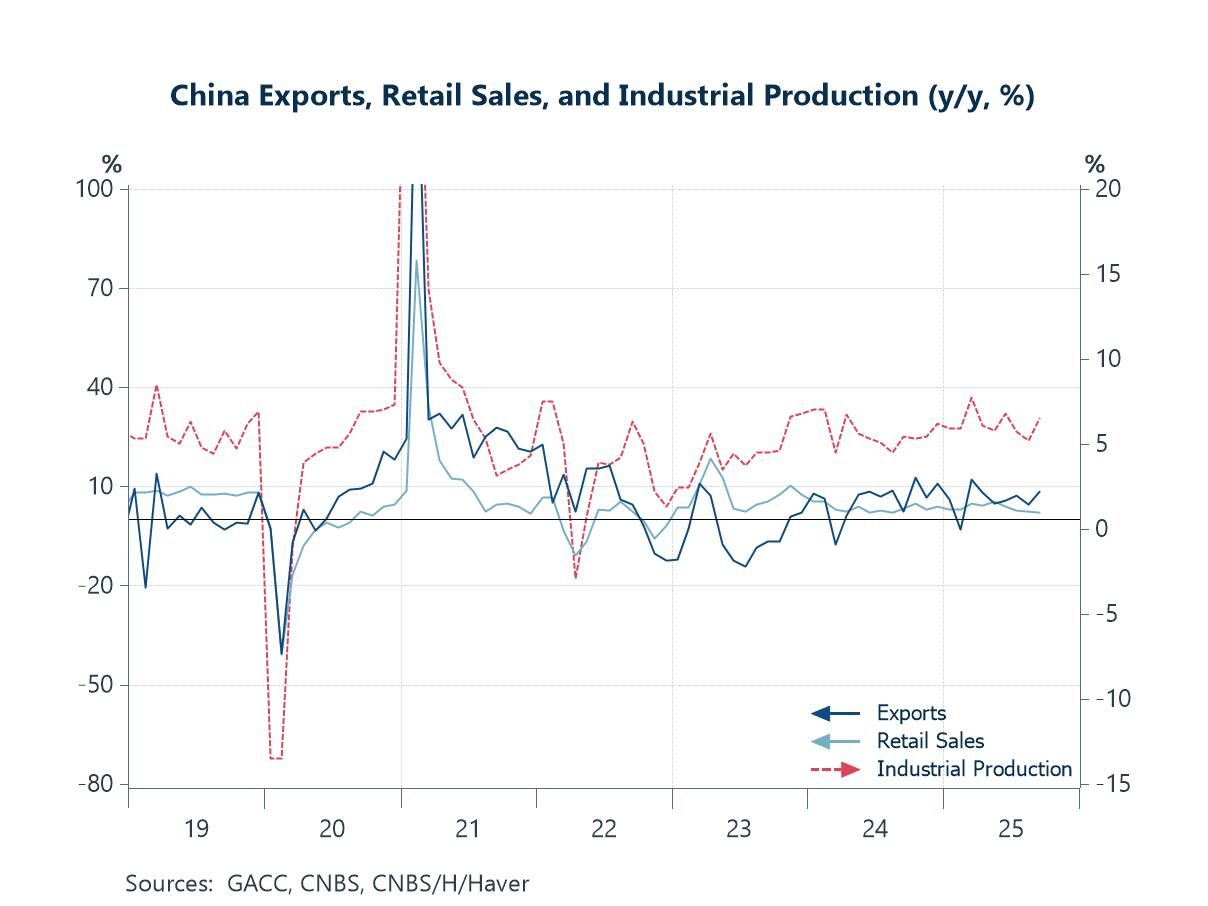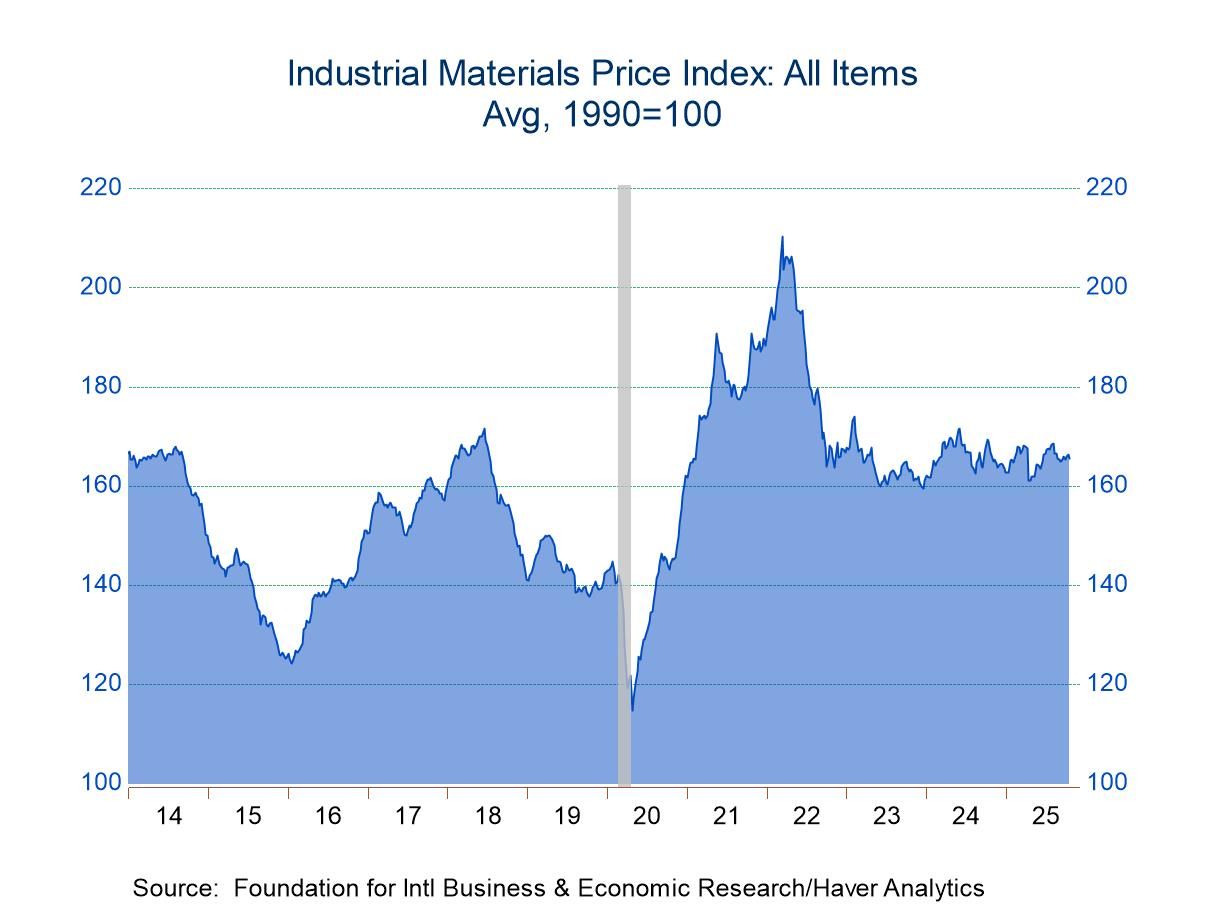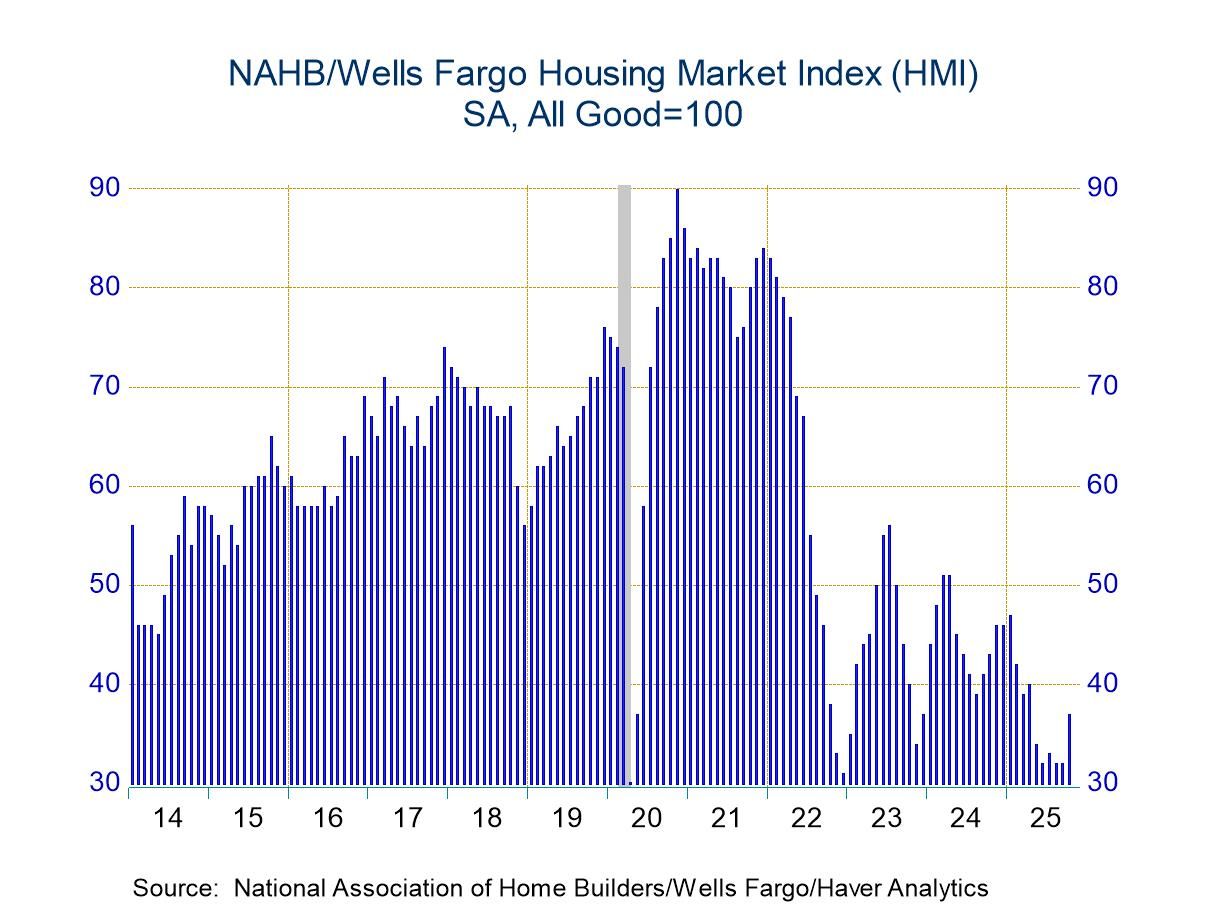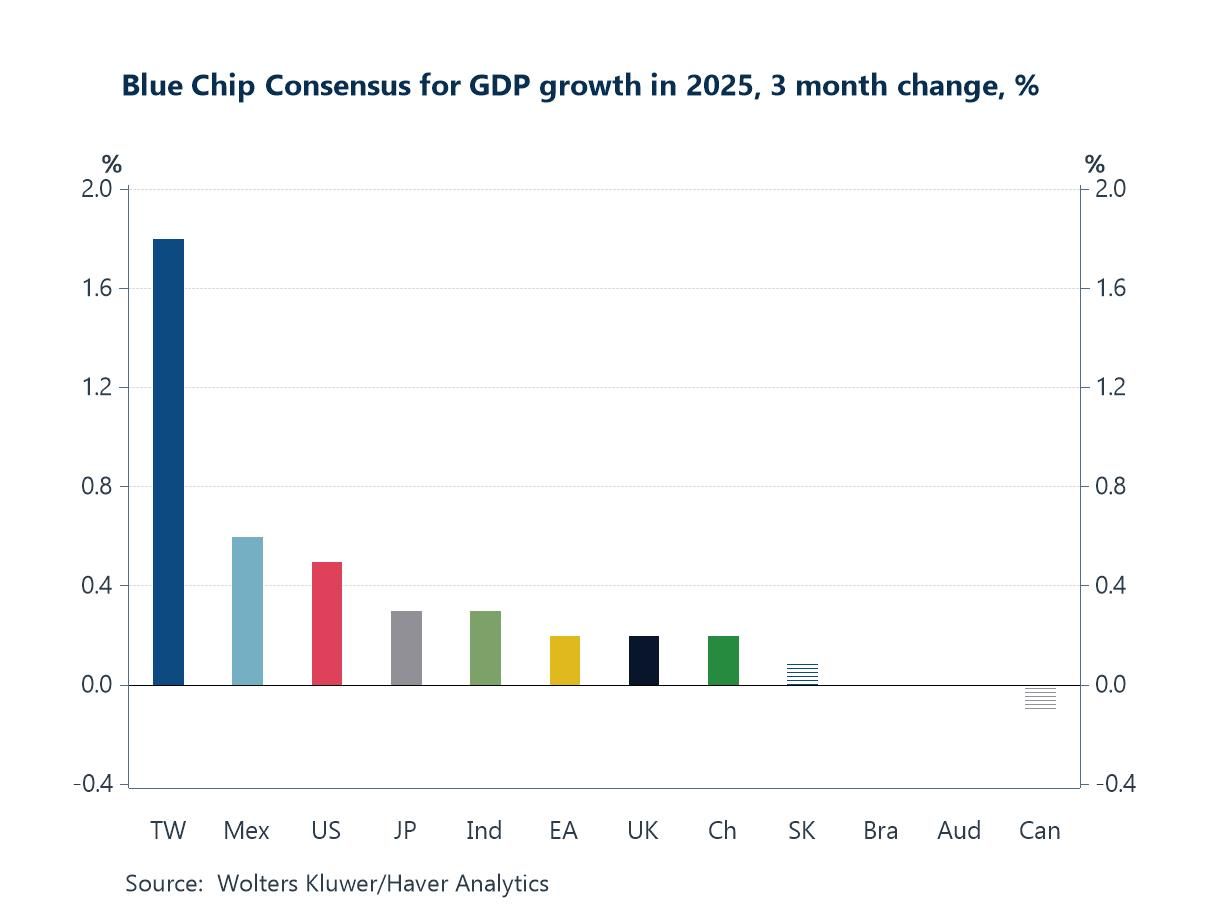 Global| Feb 14 2013
Global| Feb 14 2013EMU's GDP is Even Weaker
Summary
It is now five consecutive quarters of GDP declines in EMU...and counting. The Year-over year drop is now at 0.9%. While the US reported a drop in GDP in Q4 as well it is still stronger than any economy in the table, those are EMU [...]
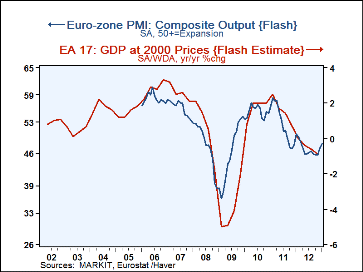 It is now five consecutive quarters of GDP declines in EMU...and counting. The Year-over year drop is now at 0.9%.
It is now five consecutive quarters of GDP declines in EMU...and counting. The Year-over year drop is now at 0.9%.
While the US reported a drop in GDP in Q4 as well it is still stronger than any economy in the table, those are EMU economies reporting GDP early, plus the UK.
The Netherlands is the only EMU economy in the table with a smaller Yr/Yr drop in GDP in Q4 than in Q3. The UK also has done that and for two quarters running.
The UK economy- Despite the way the UK economy has disappointed it is still showing some reason to hope that it is still engaged in a bottoming process rather than suffering a new lapse. Perhaps the UK will have more of a rounded bottom recession than a sharp 'V'-like bottom. Right now the UK looks as though it existed a classical recession and has begun to sputter in the recovery. The recent episode of weakness looks more like a really bad recovery than a new recession because it lacks the severe downward thrust of recession but it does have multiple quarters of negative growth. Even though four of the last five UK quarters have posted negative GDP growth quarter-to quarter only one of them has registered a 'measureable' decline in year-over-year growth- none a decline year over year growth of even 0.5%..
In the chart we feature the Yr/Yr GDP declines in EMU plotted against the EMU composite PMI from Markit. The chart shows the Markit composite turning up even as the GDP slide is gathering pace. This is not an anomaly but is as expected. Note that although the PMI was new in 2006 it did peak ahead of the cycle peak in GDP. In the recession trough in 2009 it began to move up before GDP. Such is the nature of the PMI surveys. They are sensitive gauges of activity. The PMI message now is reassuring, but not definitive.
We can hope that once again the PMI composite has it right. We can hope that its run higher endures and presages a continuing improvement in GDP implying lesser declines and eventually increases in GDP.
But we are also well-advised to keep watching the PMIs in case there is a reversal.
EMU is still under a great deal of pressure. Participating countries still have very different needs. EMU's troubles are far from solved or even salved. But economies do not crater forever.
There may be some shifting leadership within EMU but there is little strength. Germany continues to be the best performing economy in many ways especially by its consumer confidence gauge. But that has not translated into much demand support for the rest of EMU. Germany continues to be an economy based on export-led growth. And Germany is so competitive that it continues to be able to prosper at EMU exchange rates that punish other EMU members. And this divergence in competitiveness is something that we thing will continue to haunt the Zone make its complete recovery elusive.
For now we hear the less competitive members of EMU screaming about the recent strength in the euro. The G-7 recently has issued a declaration about exchange markets and members have signed onto the declaration that says the G-7 does not engage in exchange rate targeting. Even so Japan has been a bit of a rebel in this. So far, while there is undoubtedly some discord within the G-7 about this behavior, for the time being Japan is being cut its slack. But this remains a live issue and one in which different EMU members have different views.
Weakness is the new order in the global economy. Exchange rate manipulation is the new fear. Under performance is the ongoing reality. Austerity is still the main tool of the trade employed in concert with monetary expansion.
While any one country might be able pull off such a trick it seems very unlike that a group as diverse as the global network of economies will find a way to exit this situation gracefully, with dignity, without economic discord or without further economic knock-on effects.
Nor is it surprising that geopolitical tensions have heated up as economic times have deteriorated. While I have not featured China in this discussion it is there and very much party to what is going on. This is the year that it is being forced to depend on its own domestic demand for growth since domestic demand is so lacking in the rest of the world. Germany is still in the cat-bird seat of competiveness and with its focus on high-end markets that are more resilient even when times get tough. Still there is enough angst to go around and the global situation is barely generating any reason for optimist despite the small upturn in the market composite PMI.
The market and economic fundamentals still show a great deal of strain. With that the risk factor to continued or renewed growth has to be considered high.
| E-Zone and Select G-10 Country GDP Results | |||||||
|---|---|---|---|---|---|---|---|
| Q/Q SAAR | Year/Year | ||||||
| GDP | Q4-12 | Q3-12 | Q2-12 | Q4-12 | Q3-12 | Q2-12 | Q1-12 |
| EMU | -2.3 | -0.3 | -0.7 | -0.9 | -0.6 | -0.5 | -0.1 |
| Belgium | -0.4 | -0.1 | -2.0 | -0.4 | -0.4 | -0.3 | 0.4 |
| France | -1.1 | 0.6 | -0.4 | -0.3 | 0.0 | 0.1 | 0.2 |
| Germany | -2.4 | 0.9 | 1.1 | 0.4 | 0.9 | 1.0 | 1.2 |
| Greece | -24.9 | -4.6 | -7.7 | -10.8 | -6.8 | -6.8 | -6.3 |
| Italy | -3.7 | -0.8 | -2.9 | -2.7 | -2.4 | -2.3 | -1.3 |
| The Netherlands | -1.0 | -3.8 | 0.7 | -0.9 | -1.3 | -0.5 | -0.8 |
| Portugal | -7.0 | -3.5 | -3.9 | -3.8 | -3.5 | -3.1 | -2.3 |
| Spain | -2.8 | -1.2 | -1.6 | -1.8 | -1.6 | -1.3 | -0.7 |
| UK | -1.2 | 4.0 | -1.6 | 0.1 | 0.1 | -0.3 | 0.2 |
| US | -0.1 | 3.1 | 1.3 | 1.5 | 2.6 | 2.1 | 2.4 |
| EMU less Germany | -2.3 | -0.8 | -1.4 | -1.4 | -1.2 | -1.0 | -0.6 |
Robert Brusca
AuthorMore in Author Profile »Robert A. Brusca is Chief Economist of Fact and Opinion Economics, a consulting firm he founded in Manhattan. He has been an economist on Wall Street for over 25 years. He has visited central banking and large institutional clients in over 30 countries in his career as an economist. Mr. Brusca was a Divisional Research Chief at the Federal Reserve Bank of NY (Chief of the International Financial markets Division), a Fed Watcher at Irving Trust and Chief Economist at Nikko Securities International. He is widely quoted and appears in various media. Mr. Brusca holds an MA and Ph.D. in economics from Michigan State University and a BA in Economics from the University of Michigan. His research pursues his strong interests in non aligned policy economics as well as international economics. FAO Economics’ research targets investors to assist them in making better investment decisions in stocks, bonds and in a variety of international assets. The company does not manage money and has no conflicts in giving economic advice.



